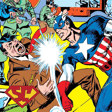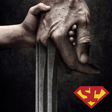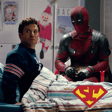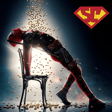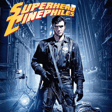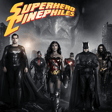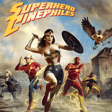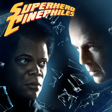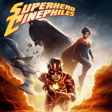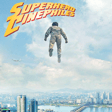Become a Creator today!Start creating today - Share your story with the world!
Start for free
00:00:00
00:00:01

The Mask of Zorro
Pulp author John Bruening is back to discuss another pulp hero. In this episode, we look at 1998's The Mask of Zorro directed by Martin Campbell. We talk about everything this film gets right, especially the wonderful performances from Antonio Banderas, Anthony Hopkins, and Catherine Zeta-Jones.
--- Send in a voice message: https://anchor.fm/superherocinephiles/messageRecommended
Transcript
Zorro vs. Scarlet Pimpernel: Impact & Legacy
00:00:14
Speaker
I got the black stallion. I can resin the quartet. Don Diego, the people will be speaking the name of Zorro again. You think stealing a horse and scratching marks on a wall makes you worthy enough to wear that mask? Be careful. You're a thief, Alejandro. A pitiful clown.
00:00:41
Speaker
Zara was a servant of the people. He was not a seeker of fame like you. A buffoon. Zara did what was needed. No, he's needed again.
Alejandro's Path: Frustration & Revenge
00:00:56
Speaker
I didn't ask for your help in the cantina, but I came here to learn how to fight like you, to have your strength, your courage. Now when I try to use them, you slap me down.
00:01:12
Speaker
Let me tell you something. I am tired of all your training, your lecturing. I am tired of waiting for you to tell me I am ready. I have my own scores to sell, a new life to find. I thought I could do it here, but I was wrong. Leandro! Anger!
00:01:44
Speaker
Choose your weapon. Montero has invited every don in California to a banquet at the Salienda.
From Bandit to Gentleman: Alejandro's Transformation
00:02:10
Speaker
If you want to be of service, you can join them as a spy. I think I do not understand, sir. You have passion, Alejandro, and your skill is growing. But to enter Montero's world, I must give you something which is completely beyond your reach. Yes, and what is that? Charm. And what is that?
00:02:40
Speaker
Convince Montero that you're a gentleman of stature, and he will let you into his circle. Me? A gentleman? This is going to take a lot of work. Yeah.
Zorro on Film: History & 'The Mask of Zorro'
00:03:02
Speaker
Welcome to the Superhero Cinephiles podcast. I'm your host, Perry Constantine. So there's a little bit of a scheduled change. I had mentioned the last episode that we were doing a trio of Batman movies, but that one actually got delayed. But instead we've got something kind of similar to Batman. We're talking about one of the precursors and another one of the pulp characters. And when we're talking pulp heroes, figured you might as well bring back the guy who knows a lot about it. And that's John Brunning. John, how are you doing today?
00:03:36
Speaker
So like I said, today we're talking about Zorro films and you had emailed me about doing a few different ones. And the one that really jumped out to me was one of the most recent ones and that's 1998's The Mask of Zorro with Antonio Banderas, Anthony Hopkins, Catherine Zeta Jones and directed by Martin Campbell. But before we jump too much into the movie, why don't you tell me a little bit about
00:03:57
Speaker
I'm good, Perry, how about yourself? Doing pretty good.
00:04:04
Speaker
what your connection with this character is. Well, certainly he's a pulp character, and one of the earlier ones actually, he goes all the way back to, he was, he first appeared as the lead character in a pulp story called The Curse of Capistrano, which was in All Story Weekly, written by Johnston McCully and that was in 1919.
00:04:28
Speaker
And he continued to write numerous Zorro stories all the way into the 1950s, I think. And then when he was done, a lot of other writers have picked up the mantle since then and have written a number of stories to the present day. If I'm not mistaken, I think Moonstone Books is currently getting ready to publish
00:04:47
Speaker
a Zorro story by my publishing partner at Flinch Books, Jim Beard. I don't know when that's coming out, but I think it's coming out sometime in the next few months. So clearly the Zorro legacy continues for a little over a century now. So yeah.
Zorro's Origins & Dual Identity Theme
00:05:05
Speaker
And the thing that always struck me about Zorro
00:05:09
Speaker
is that he is very similar to the Scarlet Pimpernel, which was not necessarily a Paul character, but he was the title character in a very influential 1905 novel by Baroness Ortsy. Yeah. And very much an influence on Zorro, I believe, in that he was the Scarlet Pimpernel was on the surface, a sort of
00:05:28
Speaker
foppish and unmanly figure and often regarded with contempt by the other male characters in the story. But his secret identity was very much a daring and courageous avenger. So I think the Scarlet Pimpernel, which appeared a good 14 or 15 years prior to Zorro, certainly had a pretty significant influence on the development of the Zorro character when Johnston McCauley developed it. Yeah, I read that as well.
Scarlet Pimpernel's Influence on Zorro
00:05:56
Speaker
by Emma Orksey, who did Scrum and Pimpernel. And that was first published in 1905. So yeah, about it. Did I say 19? Yeah, yeah, 1905. Actually, I think in its first iteration, I think it may have been a stage play. I'm not certain about that. Yeah, yeah, yeah. Did there mention something about, I didn't know if that was the play was based, it just said like after her successful stage play. I wasn't sure if that was necessarily the same one or,
00:06:23
Speaker
I think it might have been okay she eventually like sort of transformed it into the you know the the prose genre and it became it became a novel in 1905 and yes I'm always country was I think was the was the play. Correct yeah and what's what's I'm always kind of fascinated and well I'm fascinated by a couple things a the fact that like.
00:06:44
Speaker
Her character was so influential on so many subsequent characters, especially in pulps and comics, not just Zorro, but also you have Clark Kent Superman, you have to some degree, you have Bruce Wayne Batman. You could even make, let's see, there's Peter Parker in the 60s. You could even make the case that maybe to some degree, Indiana Jones was somewhat influenced by the Scarlet Pimpernel in that he is sort of a,
00:07:12
Speaker
a soft-spoken and retiring archaeology professor by day, but then he has this other alter ego where he is this very much this adventurous explorer. So the ripple effect of the Scarlet Pimpernel has gone well into the 20th century and beyond. And what's always interesting about that to me is few people recognize
Female Authors' Impact on Superhero Genre
00:07:34
Speaker
her and her influence on not just the genre of pulps, but also I would say comics, film, et cetera.
00:07:42
Speaker
She's often forgotten in spite of the fact that she made such an enormous mark on that kind of character. Yeah, when you're talking about the double identity thing, Clark Kent Superman was the first thing that kind of jumped out to me that kind of like the mild-mannered reporter and then becomes the Man of Steel after that. And then Bruce Wayne to an extent as well and a lot of iterations, he has the billionaire playboy facade where he's kind of like,
00:08:10
Speaker
often portrays himself as kind of like bumbling or, or, or unknowing or ignorant or all that. Yeah, yeah, yeah. Also, I think you can make an argument for like Daredevil as well with the whole, yes, especially in the early issues when he really played up the blindness angle. Sure, sure. Yeah, that's something that has always been and yeah, you're right. You know, basically,
00:08:35
Speaker
you know, the superhero genre was essentially invented by a woman. So that's really interesting, especially in light of all the the comics gate stuff and that goes on now. Yeah, absolutely. And it's a woman who is sort of forgotten in terms of her influence on the genre, which is I think I think more recently, she's gotten a little bit more of her due, but it seems like for decades, if not a century, it was no one ever connected those dots. Yeah. And yeah, you're right. It was the
00:09:01
Speaker
The, the, it was, it was the dime novels what they were called so it was kind of right right exactly the British equivalent of the pulps. Right, right, right.
Zorro's Global Media Impact
00:09:10
Speaker
And then, certainly, you know, I know we're here to talk about one specific movie but Zorro has been, I mean he has been in more movies than I can count frankly, at least, I want to say at least 10 feature length films in the US alone.
00:09:29
Speaker
and then many more in, not just in Europe and the UK, but also even like Turkey and India. He certainly, you know, Zorro has made his mark all over the world. Also a number of TV shows and animation. Oh yeah, animated, yes, absolutely. And he's been in comics ever since the 19, I want to say the 19th.
00:09:46
Speaker
40s or 50s. I think he became very popular in the late 50s with the Disney television series that ran for, I think, two seasons starring Guy Williams. And I think Dell Comics was running a Zorro series in tandem with that show. So he's been all over the big screen, small screen, live action, animation. I think there were actually, there were a couple of, if I'm not mistaken, there were some
00:10:15
Speaker
radio programs too yes yeah in the 1940s and 1950s I think uh yeah a couple short-lived radio dramas and audio dramas produced in the US and the UK uh some as recently as 2011 in the UK um as we said animated television um there there I think there've been some announcements in the last couple years of a couple live action television series that are currently in development okay
00:10:42
Speaker
including one from Disney ABC, but I don't know the status of those specifically, but I have read that there have been a couple announcements of some live action television projects.
00:10:54
Speaker
There's also a dynamite's been doing a bunch of Zorro comics. They had, Matt Wagner had did a 20 issue run. He had teamed up
Django/Zorro Film Collaboration Possibility
00:11:02
Speaker
with like the Green Hornet and Cato and the Shadow and the Mask series. And what I think was probably the most interesting and which is apparently being developed as a film is Django Zorro, which was co-created by, co-written by Quentin Tarantino himself with Matt Wagner.
00:11:22
Speaker
and brought back. It's a sequel to Django and Chain, brings back Django from that and has him team up with an aging Zoro. And they're working on developing a movie and both Tarantino is not probably going to direct it, but he's going to produce it. But, you know, Jamie Foxx wants to come back and apparently they want Antonio Banderas to come back as Zoro.
00:11:45
Speaker
Wow, he's not necessarily a young man anymore. Well, I think that kind of works for the series because the whole point of it was that Zorro's aging in the series. Right. I remember Banderas doing an interview after the making of the sequel, the 2005 sequel, The Legend of Zorro.
00:12:01
Speaker
And I remember him saying, what I didn't realize was eight years had passed since we made this last movie. And I'm eight years older than I was before. And the sum of the stunt work is not as easy now as it was then. And it wasn't easy then. So yeah, he was very aware of the passage of time back when he made the sequel, which is a good 15 years ago. So yeah, I think he's close to 60 at this point, if I'm not mistaken, but I'm not sure about that. I mean, he did The Expendables. Was it the third one he was in, I think?
00:12:34
Speaker
So he's still able to do some action stuff. So maybe he'd be able to do that if he's playing an older version of the character. But it's funny you mentioned that because they had changed the ending of Legend of Zorro because the original ending had
00:12:50
Speaker
their son taking up the mantle and it showed like an older Antonio Banderas and Catherine Zeta Jones watching, you know, watching over him type of thing. And they had changed the ending because they thought they would get like another sequel out of that with Banderas coming back. Well, yeah, I mean, I saw the sequel, I saw Legend of Zora once, you know, for as good as I thought the original, the Mask of Zora was in 1998, I thought the sequel was pretty weak and I'm not alone. A lot of the critics
00:13:20
Speaker
weren't too happy about it. And it didn't do well in the
'The Mask of Zorro': Audience Reception
00:13:22
Speaker
box. Yeah, I mean, it's got a pretty significant drop off in ratings, because the first one got like an 82 on Rotten Tomatoes. And the second one got like a 47 or something. Yes. Yeah. Yeah, not often such a big drop off like that.
00:13:35
Speaker
I remember seeing the sequel in a theater with my wife. It was our anniversary, so it must have been like fall of 2005. And we were both kind of excited to see it because we both liked the first one. And we walked out of the theater and kind of looked at each other and kind of went, you know, it was just it wasn't it just didn't have it. It was a lot of a lot of the things that worked in the original movie did not work very well, if at all. Yeah. Yeah.
00:13:58
Speaker
Yeah, and it's not because you had, you know, basically the the entire team coming back to that right minus Hopkins Yeah, sure. And it was so weird because I remember back when that movie when the first one came out. There was so much talk and everybody was asking when are we gonna get a sequel when are we gonna see well then like, you know, eight years later they finally give it to us and nobody really wants it.
00:14:19
Speaker
Right, well, it was, yeah, it was, it lacked a lot of the style. It's funny because, you know, the chemistry between Ben Derris and Catherine Zeta Jones was so good in the first movie. And it just didn't seem to be there in the second. And maybe they just weren't happy with the script. I don't know, but it just felt very flat all the way through. Yeah, yeah. So let's talk about this one, Ben, The Mask of Zorro, 1998. I assume that you saw this in the theater.
00:14:49
Speaker
I did. I saw it right when it came out. It was – I reviewed it actually for an alternative weekly newspaper I was working for at the time. It was one of the earlier movies that I ever reviewed.
00:15:01
Speaker
I remember I did a lot of homework. I watched the 1920 silent version with Douglas Fairbanks, the Mark of Zorro. I went back and watched the 1940 version of the Mark of Zorro with Tyrone Power. Either before I saw the movie or right after, I actually found a –
00:15:20
Speaker
a paperback version of Johnston McCully's original story, which was quite good, actually. So I did my homework around this movie. So yeah, I did see it in the theater. It was a great experience. I didn't know what to expect. I wasn't really familiar with Banderas. I was to some degree, but not a whole lot.
00:15:39
Speaker
I had just seen Catherine Zeta Jones two years earlier in The Phantom, which you and I discussed a couple months ago. But I was excited about seeing the character on the big screen and I was not disappointed. Yeah, I don't think I saw this in the theater. I saw it sometime afterwards. I'm not sure if it was like, I think I had seen it, rented it at one point, maybe like a year or two after that.
00:16:02
Speaker
And I remember really enjoying it at the time and then finding it, rediscovering it on DVD a few years later and, you know, one of the used DVDs sales or something and picking it up just with like a whole bunch of others and then rewatching it and be like, oh wow, this is a lot better than I remembered. It's kind of like one of those movies that you kind of forget about. It doesn't like stick out in your mind, then you rewatch it and you're like, how come more people don't talk about this movie?
00:16:29
Speaker
Well, I'm not going to lie. I think there are a couple of things that don't work as well as they could. But for the most part, I think they are far outweighed by the things that do work very well, I think. As I said, the chemistry between Banderas and Catherine Zeta-Jones is quite good. Anthony Hopkins is Anthony Hopkins. He was still coming up. He was still riding high. He had done Silence of the Lambs, I think, in 91, which was a good six or seven years prior. But still, I mean,
00:16:57
Speaker
That movie catapulted him to pretty much icon status. So anything he did after that, people were watching very closely. And he did a great job, I thought, as the older Zorro who passes the torch on to Banderas.
00:17:09
Speaker
And, you know, so that threesome was just a solid cast and the supporting cast was also good. Yeah, I just I was I it's I would say, you know, enjoyable is an overused word when talking about movies, but I would call it that, you know, it has a few flaws here and there.
Director Martin Campbell's Action Film Success
00:17:26
Speaker
But for the most part, it's just a very, very fun movie to watch. Yeah. One of the things that as I'm rewatching it, I was thinking, I'm like,
00:17:37
Speaker
I know this, and it was directed by Martin Campbell, who he not only did this, but he also, you know, kind of relaunched James Bond twice, because he did GoldenEye in the mid-90s. And then when they rebooted the series with Daniel Craig, he directed Casino Royale. Yes. The best movies in both those eras of Bond, right? GoldenEye, definitely the best of the Brosnan ones, and Far and Away, you know, Casino Royale was the best of the Craig era. Oh, yeah.
00:18:06
Speaker
And this was kind of like his first foray into superhero type media, which eventually got him the job of doing Green Lantern which I know a lot of people, I know I know I'm gonna get hit no for this but I actually kind of
00:18:21
Speaker
I don't hate Green Lantern. I kind of enjoy it. I think it's fun. I think I agree. I mean, I think I only saw it once. My takeaway was, well, that wasn't great, but it wasn't awful either. I'm kind of middle of the road on that movie. I don't think I hated it as much as some people did, but I wanted to like it more. I'll put it that way. Yeah. I mean, I'm also not a really big Green Lantern fan. So, you know, take that with as much of a grain of salt as you need. Sure. Sure. Yeah.
00:18:50
Speaker
But you mentioned the two Bond films. Just today I read, I'm not sure, I was doing some homework about this in preparation for this discussion, and I read somewhere that Martin Campbell, he was offered the opportunity to
00:19:08
Speaker
direct subsequent Bond films after Goldeneye, but he basically said, I think this character is getting stale. I think this franchise is getting stale. If you come up with a better actor, I may reconsider it. And I don't know if, I don't think Goldeneye was Brosnan's last Bond movie, was it? No, that was his first.
00:19:30
Speaker
It was his first okay so but sure enough he got offered Casino Royale with with with Daniel Craig and he took it because he liked he liked he liked the idea of Daniel Craig and he liked he liked the story and he liked the idea that they were sort of you know.
00:19:44
Speaker
revitalizing the whole Bond franchise. I kind of agree with him. I saw some of those last movies before Craig and I thought, God, I feel like I've seen this movie over and over again. Yeah, it got into a sameness, although I thought Brosnan, I would definitely take Brosnan over Craig though. Really? Yeah, just like Craig, I was watching No Time to Die a few weeks ago and it's just,
00:20:12
Speaker
I don't know, like aside from Skyfall, his and Casino Royale, most of his Bond movies, they didn't really do much for me. I think like his take on the character was just kind of very dour and it just
00:20:25
Speaker
It wasn't very appealing. Yeah, I agree. And here's the part where I might get crucified or hate mail but I'm not a huge Bond fan. And okay, I've seen I've seen several I've seen. I'd say I would say I've seen most of the movies, but I haven't seen all of them. So I can't say I you know I've, I've done the deep dive and James Bond 007.
00:20:45
Speaker
But where was I going with that? But I don't dislike Brosnan, but I thought Craig coming out of the gate was strong. He was really strong in that first movie. Yeah. But right. I think I think he got tired pretty quick. I think very quickly. I think he said so publicly. He basically I think there were a couple of public announcements. He basically said, I'm getting tired of doing this, doing this guy. And it's time for me to step away. Yeah. So but yeah, so I mean,
00:21:11
Speaker
You know, every Bond actor has had his place. You know, I think I like Craig more than you did, but I see your point. I mean, a very different take on the character. Yeah, yeah.
00:21:23
Speaker
But tying it back to this, one of the things that I thought was really cool that this movie did is, I think this may be, because I know they had done this in previous Zorro films, but I think in the modern era at least, this was probably the first time we really see like a legacy character in a superhero movie, where we see like that passing of the torch, because that's a thing in superhero
Legacy Characters in Superhero Films: 'The Mask of Zorro'
00:21:48
Speaker
lore, like you get the,
00:21:52
Speaker
you know, different characters have been the Flash, different characters have been Green Lantern, Batman, Captain America, and so on and so forth. But in superhero movies at least, you didn't really see that that often. Like it was always the main guy and you don't really see a whole passing of the torch. You don't see that legacy aspect until probably, yeah, yeah. I don't think we really get to that until probably,
00:22:20
Speaker
I wanna say maybe Falcon Winter Soldier. I mean, I'm sure I'm forgetting something, but I'm trying to think and I can't really remember anything. Well, you raise an interesting point about the whole genre. I mean, if you really step back and look at it, and this is gonna sound almost Jungian, but in almost every instance,
00:22:43
Speaker
in this genre, in the superhero genre, the hero does not truly become the hero until the father or the father figure dies. Oh, yeah. Which I think speaks somewhat to what you're talking about, the idea of the backstory, the events leading up to the creation, the genesis of this hero. But I'm trying to think, to your question, have we seen anything like that before this movie?
00:23:12
Speaker
and off the top of my head, I can't. I can't think of anything.
00:23:16
Speaker
We were talking about the Phantom a couple of months ago. And, you know, there's mention of, you know, the prior Phantom. He has those conversations with. Oh, that's true. Yeah. The spirit of his father. But but that's almost sort of incidental to the story. Whereas in this movie, it's pivotal. It's integral to the story. Yeah. Yeah. And I don't think we really. And like I said, I don't think we really see it again until Falcon and Winter Soldier. There's not really a whole lot of instances unless you count when you if you're talking animation, then we see it in Batman Beyond. But other than that,
00:23:46
Speaker
It hasn't really been done a whole lot, at least in live action. Yeah, passing of the torch. I'm just trying to think of where we may have seen that in this. And I can't off the top of my head. I'm sure I'll think of something after we stop talking. But yeah, no, I think you're right. I think this is one of the first times, if not the first time, we actually dig deep into that concept.
00:24:13
Speaker
And it's an interesting concept because they had done this apparently a few times in the movies. I'm not sure, did they ever do that in the books, do you know? There's certainly, I mean, in prior movies and in the books, there certainly are mentions of Zorro's father. You see him in
00:24:36
Speaker
You see him in the Tyrone Power version in 1940. I don't recall. It's been a long time since I've seen the 1920 silent version with Douglas Fairbanks. Even to some of the serials, there were a number of serials, Zorro serials that were made in the 1930s and 40s. And I think there's a couple. Let me see. I made some notes here. Let's see.
00:25:02
Speaker
There was one in 1947 called The Son of Zorro. George Turner plays a Civil War era descendant of Zorro.
00:25:17
Speaker
uh the ghost of Zorro another another serial in 1949 Clayton Moore also known as uh the Lone Ranger plays Zorro's grandson um so so you have those instances but those are serials those are lesser known but but I guess you know if you're gonna if you're gonna really look closely I guess you could say that those are instances where we see Zorro as as the descendant of a prior Zorro yeah yeah and it's usually a descendant this time they bring in someone uh completely different and
00:25:45
Speaker
And I didn't realize this until after I was watching the movie and I did some research. The character that Banderas plays, Alejandro Murrieta, he's the fictional brother because his brother Joaquin gets killed in the...
00:26:00
Speaker
shoots himself when he gets captured right movie and That's that's a real historical figure. He was kind of like yes. He was like a Robin Hood type of character. Yes I Did some research about that too. And yeah, that's uh, I had no I and I've seen this movie four or five times and I had I had no idea that there was actually like a Sort of a historical underpinning to those characters. I mean, you know, not just him but also the character of Harrison Love right because
00:26:26
Speaker
the real-life Murieta, who, you know, a lot of the details of his life are very sketchy. It's a lot more legend, I think, than real, but I mean, but as I understand it... Three-figure Jack as well was a real person, although he wasn't American, he was Mexican, I believe.
00:26:45
Speaker
Yes. And Harry Love, he was the leader, the real life Harry Love, he was the leader of a group of California Rangers who were assigned the task of tracking down a group of Mexican bandits known as the Five Joaquin's. And one of these Five Joaquin's was allegedly Joaquin Murrieta. And in 1853, the Rangers encountered a band of Mexicans and killed three of them. And as proof of the killing, the Rangers cut off the alleged head of Murrieta
00:27:15
Speaker
and the alleged hand of three fingers Jack and stored him in a jar of alcohol and brought them back to the authorities to collect the bounty. So midway through the movie, when you see Harrison Love, the Harrison Love character played by Matthew Letcher, when you see him pull the big jar of alcohol out of his cabinet and confront Alejandro with this severed head,
00:27:39
Speaker
you know, there's sort of a historical connection to that that most viewers, I didn't know until this afternoon I was doing some research. Yeah, and apparently Murrieta is believed to have been the inspiration of Zorro. Yes, correct. So it's interesting how they brought those back together. In this movie, he's the brother, but yeah. He's the brother, yeah. But yeah, I liked the way that they linked that and they kind of worked in the historical parallels there.
00:28:04
Speaker
Yeah, I had no idea about any of that until about five hours ago when I was doing some research. Yeah, yeah. And Antonio and so I want to mention Anthony Hopkins. It's it's really funny watching him in this. And I know we can there. There's obviously an argument to be made that, you know, you're casting
00:28:25
Speaker
You know a Welsh guy to play to play a Spaniard here and then a Welsh woman to play and a Welsh woman to play his daughter and then you cast a Spaniard to play a Mexican character. Right. They're definitely, you know, those are good points to make. Although one of the things I thought was funny is that
00:28:43
Speaker
Nobody knows that Diego is Zorro during his time as the character, even though Anthony Hopkins is probably the only guy walking around speaking with a Welsh accent. Right. Right. Exactly. Yeah. Yeah. But he's Anthony Hopkins, right? He's Anthony Hopkins, yeah. Right. Right.
00:29:04
Speaker
Yeah, he, like I said, he was, I don't wanna say he was just coming off of Silence of the Lambs, but he certainly, he was still riding high from the success of that movie and that, you know, the Hannibal Lecter character. And I think for a good decade or so after he made that movie, the guy could do no wrong. And I think, it's funny because I recently learned that actually he was not the original choice for that role.
00:29:30
Speaker
My understanding was the producers were looking at either, well, they're looking at both Raul Julia and Sean Connery. Sean Connery. Well, yeah. Raul Julia would have been perfect. He would have, but he died. Sean Connery, you know, I like Sean Connery a lot in most of what he's done. But I'm kind of glad that he didn't get this role because it would have become a Sean Connery movie.
00:29:59
Speaker
It also would have been echoes of his Roland Highlander.
00:30:03
Speaker
Right, right. Exactly. Yeah. I mean, it just, you know, I love the untouchables, but the truth of the matter is it's a Sean. It's it's it's a movie about Elliott and S&L Capone, but it's also it's a Sean Connery movie. And yeah, Sean Connery's presence in that movie and in many of his movies kind of overshadows everyone around him. Yeah. And I think it would have been a disservice to both Ben deres the actor and Zorro the character to to to put Sean Connery in that in that role in that in that movie. Yeah.
00:30:30
Speaker
Although it is, you know, we mentioned that Raul Julia had died before he could be, he could take this role. And that is a real shame because this role would have been perfect for him. Oh yeah, I think so. He died suddenly if I'm not mistaken. I think it was a heart attack or something like that. No, he had, I know he had had, he'd been sick for a while leading up to it because Street Fighter was his last movie and he was really kind of like,
00:30:57
Speaker
his illness was really kind of exhibiting itself i think it was cancer if i'm not mistaken okay it may have been a heart attack that finally did him in but i do know that he had had cancer or something like that for a while before he died not an old man by any means no no no late 40s something like that yeah yeah okay yeah
00:31:16
Speaker
That would have been interesting, yeah, to get another Latin actor in there. Yeah, but you make a good point about Anthony Hopkins, because after Silence of the Lambs, any time you had an older type of character, mentor type of character, something like that, he was always the one who was considered. He was even being considered for Jor-El when they were planning to do Superman Lives at one point. Yeah, and then eventually, obviously, they get him to play Odin in the Thor movies.
00:31:41
Speaker
Yes, yeah. Yeah, he's sort of made for that kind of role. The mentor father, you know, the sort of the wise sage, you know, mentor type. Yeah.
00:31:53
Speaker
But he he did it, you know, accent aside, he did I thought he did a really good job. And he, he really plays up those different aspects of the character he really blends those different versions, those different things that the characters going through so like the, the anger, the.
00:32:12
Speaker
you know, the longing for his daughter. But even mixed with that, like the the charm he's got as as Zorro, all of that works really well. Oh, yeah, I know. And I was thinking about this earlier today. I mean, he, you know, if you put yourself in that character's shoes, I mean, he's he's dealing with, you know, and, you know, an amazing level of rage, you know, he watches he watches his wife get murdered before his eyes, he watches his infant daughter be taken away from him and he winds up
00:32:41
Speaker
He winds up in a prison for 20 years. So, you know, here's this character with this incredible amount of rage and yet there's this very, I was struck by this very tender moment, he's in a stable he's grooming a horse and in walks Catherine Zeta Jones and he's trying very hard to have a conversation with her.
00:32:58
Speaker
without just you know screaming out the fact that you know i am i am really i am your real father etc um and it's just you you can you can feel the tension and the sadness in him like you know like like i you know i can't believe i'm here talking to my daughter who i haven't seen in 20 years since she was a tiny tiny baby and um and as she you know she says goodbye and walks away he's practically in tears it's just you know the guy the guy's acting chops are you know top notch and yeah in a role like that it just he does very well
00:33:27
Speaker
that scene really and maybe it's because you know I hadn't seen this movie since I became a father and you know re-watching it now and like I really I felt for that scene a lot more than I ever had before and I think that's that's a big part of that like it this is you know there are certain movies that when you I remember talking about this when we were talking about the the Amazing Spider-Man movies and the um
00:33:50
Speaker
the death scene with Captain Stacy and how you watch it before your father and that scene brings really differently to you compared to after you become a father. And I think this movie does the same thing. There are certain movies that after you've gone through that experience, you look at them in a very different light. Oh, anytime I see a film where children are being abducted, I never liked seeing that stuff. But once I became a dad, it was even harder to watch that. Yeah. There are instances where I can't even watch that stuff.
00:34:20
Speaker
I'm thinking of, not to get off track, but Mystic River, where Sean Penn's daughter winds up in the building. And they find her at the bottom of a ravine. I think she's like 14 or 15 years old. And there's this moment where the police are down there
00:34:36
Speaker
Huddled around this body and he's on the other side of the street and he realizes what's going on and like his friends are holding him back and he's running into the street. It just, I remember watching it and I was watching with my wife and our daughter was very young at the time and she just turned to me. She said, you want me to turn it off? I said, no, keep going. It's good. And, but yeah, I know that feeling very much. So it just, uh, it's, it's, it's harder once you become a father. Yeah. Yeah. And, uh, and Antonio, Ben, there's like, again, you know,
00:35:03
Speaker
ethnicity issues aside in the casting. I'm hard pressed to think of someone who would be a better fit for the character of Zorro because- I remember when it was announced, I thought the same thing. I thought, well, that sounds perfect. Yeah. Yeah. Because he's got, it's funny, the one scene that kind of jumps out to me is, well, the thing about Banderis is he's actually a really funny actor, too. Oh, absolutely. Yeah. I think a lot of people kind of like overlook that when they're thinking about it because he's very charming.
00:35:31
Speaker
You know, he's, he's very, he can be very dramatic, but he's also really good at the comedy aspect too. Absolutely. Yeah. Yeah. The first part where he's playing the kind of like foppish Alejandro before he, before he gets the training. It's just a lot of fun to watch.
00:35:45
Speaker
Well, you mentioned the word foppish, and he does a little bit of that in this movie, not as much as Tyrone Power did in 1940. Tyrone Power basically raised that foppish aspect to an art form. I still feel like that version has a little bit of an edge over this one because Tyrone Power
00:36:09
Speaker
handled that role in some subtle ways that just were so good. But you're right, no, Banderas is, and in some of the movies he's done since, both live action and animated, you really do realize that you're right. I mean, he's a very good comedic actor in addition to being a very good dramatic actor.
00:36:28
Speaker
Yeah, so I mean I think one of the best probably the funniest line in the film and probably the funniest line in a lot of films I've seen and I'm sure you remember the scene where you know basically Hopkins tells him okay we're gonna make you the new Zorro and he's all excited about this because he wants to you know he wants to exact revenge from
00:36:47
Speaker
from Harrison Love and he grabs a sword and he starts waving it around and he's Yahoo and Hopkins says, do you have any idea how to use that thing? And then Derek says, yeah, the pointy end goes in the other man. It's one of the funniest, clearly to me, the funniest line in the movie and the funniest line in a lot of movies I've ever seen. That one always stands out for me.
00:37:09
Speaker
Well, also along with that is, you know, he's showing off all this sword moves when he's supposed to be facing off the Zorro for the training. And then just Anthony have just take one swipe and not completely out of this flies across the room. Yeah, it's great. But what are the what are the funniest parts for me is when he tells
00:37:29
Speaker
when he tells Alejandro, he's like, you know, we're gonna have to teach you how to become a gentleman. And in the very next scene, all that training is done because it's hard to imagine like Antonio Banderas having to go through a whole lot of training for that.
00:37:41
Speaker
to be charming, right? He's almost too good for the character at that point in the movie. Yeah, and I thought of that myself. I thought, you know, this guy, you know, when you first see him as an adult, when you first see Alejandro as an adult, it's, you know, it's this hairy grizzly version of Antonio Banderas, and he's, you know, he's being dragged through the dust in the desert, and he's, you know, he's a bandit, he's a thief, and he's beyond rough around the edges.
00:38:05
Speaker
and in a matter of maybe like you know 30 or 40 minutes of film maybe not quite that much I don't know but you know he's this very charming he shows up at the bank he basically crashes the party he shows up at the banquet of Don Montero and he's just so smooth he's just a smooth customer and you're right it's just sort of like how you know how how did he pull that off in a short time like that but then again he's Banderas so yeah yeah
00:38:30
Speaker
Yeah, especially the the dancing. And I'm just like, I'm like, I don't I don't think that Antonio that that Zorro taught him how to do that. No, I don't know. Because even even Anthony Hopkins got to look surprised when he sees it. Yeah. Does that double take from the balcony? Like, wait, wait, wait, that's him. But it's funny because the dance scene is one of a couple different
00:38:53
Speaker
Zorro motifs that keeps showing up in different film versions of this character. There's a very well choreographed dance scene in the Tyrone Power version. I think there's a dance scene in the Douglas Fairbanks version, I'm not sure. There's also a scene where
00:39:12
Speaker
where Ben Derris has a quick sleight of hand trick and he pulls a rose out of his sleeve and hands it to Catherine Zeta Jones. He does similar sleight of hand magic in the 1940 version. He does similar sleight of hand magic in the 1920 version. So there's these little touchstones that the filmmakers keep coming back to. Like, yeah, Zorro does magic. Zorro's a good dancer. There was another one. There's a sword fight in this movie where, and I don't remember who,
00:39:40
Speaker
who it's between, but one of the rapiers, it slices some candles, and you see a very similar scene like that in the Tyrone Power version. Again, it's another callback to an earlier version of this story from, what, 80 years ago.
00:40:02
Speaker
And I think, I'm not sure, cause you said that Tyrone Power had played it, played up the foppish angle. And one of the things I thought, and after hearing you say that, and then thinking about that banquet scene. And I'm not sure if this is actually intentional or not, but I got a lot of Bruce Wayne vibes from the way he plays like the gentlemen type of characters. Yes, I agree.
00:40:27
Speaker
I wonder if there was a lot of influence from, you know, the more successive zero successors, so to speak. Well, in the in the terrible power version he I mean he really like there's a moment in that version where
00:40:43
Speaker
He shows up from Spain and he is told by somebody I can't remember who that basically, you know, here's the situation. Your father's been sort of ousted from power and these corrupt, you know, these these these corrupt men have sort of taken over. And and the camera goes tight on power's face. And you can see it's fascinating to watch. And I recommend it if you haven't seen it. He does this thing with his face where you can see the whole plan
00:41:09
Speaker
falling into place behind his eyes in a matter of I'm going to say three, maybe four seconds. And then from that moment on, he is this sort of like foppish waving his hanky around talking about, you know, you know, flower. It just it just from that moment on, he is instantly this sort of, you know,
00:41:32
Speaker
shy, retiring, like, don't know, I don't want to get my hands dirty. Oh, this dreadful zero character. What's he what's he all about? Even to the point where his own father is like, Who are you? You're not my son. I didn't raise you like this. And it just, and he's so good at it for the entire movie that he fools everyone, almost to the point where he's fooling you the viewer, because it's just it's, it's just so these characters are so dichotomous, and they're played by the same person.
00:41:59
Speaker
If you haven't seen it, I recommend it because I think, you know, Van Derris does a little bit of it in this film, but I think power really takes it to a next level throughout the entire story. Yeah, I think, well, I mean, I think it's hard for Van Derris to kind of turn off the charm in that kind of situation. Right. Exactly. Yeah. Yeah. Yeah. But there was a little bit, a little hint of that, I think, and that was probably a callback to the Tyrone Power stuff when, you know, he's saying that, you know, all this, you know, running around and jumping on horses gives me a headache.
00:42:29
Speaker
Right. He says something about he I think he refers to him as a dreadful character. Yeah. Yeah. Like that. Yeah. Right. Right. Call back to that. It wasn't wasn't as extreme as Power did it, but certainly sort of a nod to that. Yeah.
00:42:44
Speaker
And Catherine Zeta-Jones, like we talked about her in, as you mentioned, The Phantom. And this was like her second really kind of big role in- I think this was her breakout. I think this was the one with that. This was the movie that really put her on the map, I think. I think so too, yeah. I don't remember here much of her before this movie. And then after this movie, she was like everywhere.
00:43:06
Speaker
Yeah, exactly. And you know, for whatever reason, I mean, you know, we talked at length about the Phantom, it was a different kind of movie, but this this movie had broader appeal. So a lot more people saw this movie, a lot more people saw her in this movie. And I didn't what was interesting, I didn't, I assumed she did the accent very well, I assumed she was she was Spanish. And apparently a lot of people did because I saw her do an interview a few years later,
00:43:37
Speaker
And she joked about that. She said after I did Zorro.
00:43:41
Speaker
Hollywood just assumed I was Spanish and I'm not, I'm Welsh. And I thought that was funny because I kind of did myself. And she, obviously she was not. And, but she pulled it off. I mean, she had this, you know, she did, she did the accent very well. And she looked, you know, she looked like she could have been just the way she dressed and the way her hair was done. It just, I think she fooled a lot of people. She did. Yeah. I definitely remember being surprised when I heard her,
00:44:08
Speaker
when I saw her in another movie too speaking with the Spanish in the British accent. And my first thought was, why is she doing a British accent for this part? Yeah, exactly. Yeah.
00:44:21
Speaker
But yeah, apparently there were other, apparently Isabelle Skorupko who was in, previously mentioned GoldenEye. She had screen tested for this. Also, Salma Hayek, Jennifer Lopez, and even Shakira also screen tested for the role. Wow, okay. Shakira was not well known in 1990. No, no, I was gonna say like that. I don't think I really heard of her until probably about like early 2000s. You know, the one thing about this movie that strikes me occasionally and it,
00:44:51
Speaker
And I say occasionally, and I mean it, it's not very often, but there are moments in this film that it suffers a little bit from the same dynamic that we talked about relative to the Phantom, in that it occasionally... I don't know if it's Martin Campbell, I don't know if it's the screenwriters, but occasionally it's not sure whether it's a dramatic film or a comedic film.
00:45:16
Speaker
I think there's less of, I think there's more of that in the Phantom, although I definitely- By far. Yeah. There is a little bit of that in here, I think. Yeah, I think you're definitely right. Yeah, not much. There are a few instances where, like, you know, again, I think of the scene where Harrison Love confronts
00:45:43
Speaker
uh Murieta with uh with with the severed head of his brother I mean that to me is like that that is a pivotal moment in the story and that that's like that that is the most memorable I mean that's when you realize this you know this this is not just a villain this is a sociopath yeah yeah and um that's a pretty dark place to go in a film that is also peppered with moments of comedy as well and it just um
00:46:09
Speaker
Like you said, it happens occasionally, not as much as it did in the Phantom, but it does happen occasionally, but not enough to mar the film in any
Balancing Drama & Comedy in Zorro Films
00:46:16
Speaker
way. I think the most that happens is more in the first half of the film, like the scenes when
00:46:22
Speaker
You know, uh, when Maria does going out as kind of like the proto zero, I think there's like, there's a, trying to figure out what does it mean to be zero? Yeah. I'm going to steal a horse now. Yeah. Right. Right. Exactly. Yeah. I agree. I agree. That's when it really kind of gets it. I found myself kind of like drifting to my phone during those scenes because they were fun, but it was just kind of like, I.
00:46:40
Speaker
it didn't fit with the tone of the rest of the movie. I think that's what I'm trying to say. There are certain moments, especially in that first half of the film, where it's almost like it's not doing justice to the character. It's a little bit too mocking of the character, but not too much, but a little more than it needs to be. Once we get past the training, I think from the banquet on, the movie really finds its footing.
00:47:03
Speaker
I think that's the that's like the pivotal part of the of the movie. And that's when it really kind of like settles into what it's going to be. And from then on, it's just it's just gravy all the way through to the end. And I think I think when when when Montero takes all the other Don's, including Murrieta out to the mine to see what he's up to. Right. And that's when Murrieta has this moment where like,
00:47:25
Speaker
It's no longer just about me and my personal vendetta. This is an evil human being who's doing evil things to other innocent human beings. That to me is the moment when he's no longer just a figure of vengeance, now he's a figure of justice.
00:47:40
Speaker
Yeah, you know, he comes he makes this realization you can almost see in his face, or it's just it's like, like I can't believe what I'm seeing here, this you know he's he's he's he's made slaves of these people to mine his gold, and he's dehumanizing to the point where like he's just gonna, he's just gonna dispense with them when he's done.
00:47:59
Speaker
that to me is a really important moment in the story. I agree, it's just the second half really is much stronger. Yeah, you mentioned about Tyrone Power and how you saw in his face how like the entire plan comes together. And when you said that, my first thought was that scene, because you do kind of see that in Ben Dares' not so much, you know, a plan coming together, but just like that kind of like change when, like you said, perfectly, he goes from being a figure of vengeance to a figure of justice.
00:48:27
Speaker
Right. Right. Which I took to me is this is like, you know, those are some of those are those are the best moments of stories like this of the superhero genre. Yeah. When when when the character realizes this isn't just about me, it's still about me, but it's also about something much greater than me. That's that's that's the great moment for me. Yeah. Now, Stuart Wilson, who plays Montero, apparently originally Armando Sante had been cast in the role, but had scheduling. Yes.
00:48:58
Speaker
But I don't, you know, you know what the entire time I was watching him is I kept thinking like it feels like they want him to be Alan Rickman. You know, because they mentioned, yes, I mean, there's certainly.
00:49:14
Speaker
uh yeah the look the voice yeah I hadn't thought of that but yeah I see your point um there's something very Alan Rickman about him a la like you know in in the same vein as uh what he played Sheriff Nottingham in uh Prince of Thieves right right sure that's exactly what I was thinking about yeah yeah when he first appeared on screen I'm like wait a minute is that Alan Rickman um there's a very there's he is a very
00:49:39
Speaker
It's like he's trying to do an Alan Rickman in Prince of Thieves in a way. Although Alan Rickman was much more theatrical and over the top, which, and that kind of pulled me out whenever Montero was on screen. Cause I just kept thinking like, man, imagine if Alan Rickman had played this part. Well, you know, yeah, but I guess I go to the same place I go to when I said what I said about Sean Connery. If you had put Alan Rickman in that role,
00:50:09
Speaker
It may have, it may have been become too much about Alan Rickman and not about the character anymore. Yeah. Yeah. You know, there's a, there's a, there's a funny, I don't want to say funny. It's not a fair word, but there's a scene. I'm sure you, I'm sure you remember it. When.
00:50:27
Speaker
The older Zorro, Hopkins, he basically, he burns an enormous Z in the hillside. And it's basically, it's a message to Montero, like, like, you know, Zorro's back, you better get ready, you better deal with it because Zorro's coming for you, in whatever guys, whether it's me or my young protege, Zorro is coming for you. And Harrison, Harrison Love goes to the window and he sees this, I think they both see it through the window.
00:50:52
Speaker
And suddenly Montero is all agitated and Harrison love says I don't understand why what you're so concerned about it's just, he's just one man and and Montero says, he's not just one man damn it he's Zorro, and it's funny because I mean,
00:51:08
Speaker
That could be perceived as a very cheesy line of dialogue, but for the 12-year-old me watching that film, of course I was in my 30s when I saw it for the first time, but a line like that always pushes my buttons because it's this recognition that the villain realizes
00:51:26
Speaker
I'm not dealing with just a person. I'm dealing with an idea. I'm dealing with something bigger than a person. This is, again, the difference between vengeance and justice. He's basically saying, this person is a representative of all people. And I'm not dealing with just this guy. I'm dealing with the will of an entire group of people now. And I have to fight that battle, not just one guy with a hat and a black cape and a sword.
00:51:54
Speaker
something else that this movie I think did really well. And it kind of did something, Raiders, it did something kind of similar to what Raiders of the Lost Ark did where Raiders of the Lost Ark was kind of like this love letter to the adventure serials. Whereas this was kind of like a love letter to the like the swashbuckling pictures like the 1940s. And it
00:52:19
Speaker
And, you know, mentioning Alan Rickman and Prince of Thieves is an interesting comparison to look at that movie because Alan Rickman is like the only actor in that movie who thought he was doing like an homage to the swashbuckling pictures, whereas everybody else is playing it very dour and serious. Right, right, right. This movie, you know, it's got, it's the opposite of that, right? Everybody knows what they're doing. And kind of like we were talking about with the Phantom,
00:52:47
Speaker
you've got Billy Zane and Catherine Zeta Jones trying to play it mostly like a serious movie. And then you've got treat Williams and Christie Swanson playing it as if they're in a parody. This movie, you don't really have any of that problem. Like it's solid all the way through. It's very much that homage. It very much captures that feel of those old swashbuckling movies.
00:53:10
Speaker
Yeah, I mean, and I'm thinking of some of those old movies. Certainly there was there was Captain Blood with Errol Flynn, Adventures of Robin Hood with Errol Flynn, both in the 1930s. There was, I mean, I, you know, I would count the 1940s version of Zorro among the Swashbuckler movies.
00:53:27
Speaker
So yeah, I mean, I've seen a lot of those. I'm familiar with a lot of those. And I think you're right. I think I think they were kind of going for that. I mean, you could almost see if Errol Flynn were alive today and young and healthy and, you know, in good shape. You can see him in this role. I mean, why not have a Tasmanian in the role? Because you've already got a bunch of Englishmen. So, you know, why not? Yeah.
00:53:51
Speaker
But yeah, and that brings up another point is the action in this movie. I mean, it's Martin Campbell, so he knows how to direct an action scene and it's done really well. But the standout for me is the scene when Zorro faces off against love.
00:54:07
Speaker
and he pulls out the sword and the sun glints off it. And that's not CGI or anything that was all natural. And that was Banderas' idea, actually. He wanted to have the light, the sun glinting off the sword. So they had to do like, it took them like three takes to get it just right.
00:54:25
Speaker
god only three i would expect i would figure you know to stage that properly in natural sunlight that would take like i would think that would take like 15 or 20 yeah yeah only three times if you did it in three good for them yeah that's that's fantastic because it was great effect i remember i remember the first time i saw it in the theater i thought wow that's cool i mean it's it's one it's it's it's a small momentary split second thing but you don't miss it it's right there and you know bigger than life you don't miss that and it's just a
00:54:48
Speaker
perfect visual touch. Yeah, I really like that. That whole, that whole face off. What I liked, you know, the thing that Campbell did really well, I thought was you basically had these two heroes confronting their nemeses for literally the same time. Yes. Like probably within like 100 yards of each other, each fighting their own war for their own reasons. But like,
Climactic Hero-Villain Confrontations
00:55:11
Speaker
It's sort of in parallel, but also like you know it's all intersecting in this one place in this one time in this one moment and. And yeah I just it's like there are so many like I want to say.
00:55:26
Speaker
false endings to that battle just when you think you know just when you think uh you know the hero has that has the villain licked there's always some there's always some trick that they have up their sleeve you know it just i think it happens like three or four times in each case and um it you know just it draws out this is the action it draws out the suspense but it's it's done well one of the parts that really jumped out at me is um
00:55:51
Speaker
when Diego is fighting with Montero and he shouts to Elena to get the people out. And it's just this one small line, it's like a blink and you miss it type of thing, but it says so much about his character in that moment that I realized on retrospect, because earlier there's that whole talk about, well, are they fighting for justice or are they just fighting for revenge?
00:56:16
Speaker
And Diego proves in that moment that he's still fighting for justice too, because he's concerned about the other people. And I thought that was a really nice touch. And I think that is the coda to the moment that we were talking about earlier when he and the other dons are visiting the mine. And he has that epiphany like, wow, this is insanity in real time. And I think his, like you say, his turning to Elena and saying, get the people. Well, that was Diego who says that to Elena.
00:56:47
Speaker
Murray, not Alejandro. You're right. Okay. You're right. You're right. Okay. Well, yeah. But it is a coda to another thing though, because there was that earlier conversation where, because Alejandro asks Diego, like, what about the people and all that when they're in the, in the Zorro cave, you know, for lack of a better term. Right. Right. Right. Right. And, and he seems to be more caring about the,
00:57:14
Speaker
about, you know, getting revenge and getting his daughter back. And that moment when he tells Elena to get the people out, that's kind of like the moment when that that's the coda to that scene. Right. You know, it's funny because that it's maybe I didn't know it when I first saw the movie twenty three, four years ago. But it seems like that has become a more common
00:57:38
Speaker
I guess the word is motif plot plot twist. The you know, one of the two heroes just backs away says this is that this is not my deal. I'm done. I'm out. I you know, I can't I've done everything I can do. I can't commit to any more of this. This is too much for me, etc. And they bolt. And then but in the third act, guess who shows up when the chips are really down? It's that that the you know, that one character that one hero character who
00:58:03
Speaker
who thought they wanted to walk out on the whole situation, but realized they couldn't. Right, like the Han Solo moment. Right, exactly. Yeah, and it just... I've become, for whatever reason, I've become more aware of that storytelling style than I had been, say, 30 years ago, but I think that this movie is a really good example of that, you know, for the reasons you just said.
00:58:23
Speaker
Don Diego is basically it's like, you know, I just I'm just here to get my daughter and get my life back Yeah, and I'm done. I'm out and which is really I mean it is I mean and and and Alejandro's Response to that is this sort of like like disbelief like shock like I can't I can't believe you you've brought me this far and now you're gonna walk away Yeah, and you the viewer kind of go there with him because it is kind of surprising to to hear
00:58:50
Speaker
Don Diego say that because he was the one who's so committed to making sure that you know that all the scales are balanced. So, so yeah, so it's a
00:58:59
Speaker
It's almost like, you know, the thief in the bandit becomes a real hero. And the guy you thought who was the real hero is basically ready to bail at a moment's notice. Yeah, yeah. Something else, too, that jumped out at me rewatching this movie is the way that Diego reacts when he sees Alejandro and Elena together. Because in a lesser movie, I think they would have played up the whole, you know, overprotective father angle.
00:59:25
Speaker
where it's like, you know, you're, you know, even though you're Zorro, you're, you're a bandit and, you know, stay away from my daughter type of thing. But you never get any of that in this movie. You don't. Because, you know, you see him like at first when he looks kind of surprised to see them dancing, but then he smiles. I was gonna say happily surprised. Exactly. Like I said, I said this before, he's up on the balcony.
00:59:48
Speaker
he's posing as the footman and he looks over the balcony at the dancing going on on the floor below him and it's like a double take that he does and you're right you almost expect him to just sort of roll his eyes like what the hell is he doing with my daughter he's here he's here on a mission effect mining mission and he's dancing with my daughter but you're right he smiles and it's almost like he knows intuitively
01:00:11
Speaker
Of course, this is, you know, I have this high-spirited daughter and I've taken on this very high-spirited protege. It just stands to reason that they would wind up together because that they're sort of like, you know, two sides to the same coin. Yeah. And I like that the movie avoided that kind of cliche. Yes. You know, the you're not good enough for my daughter type of thing. Because that's a trope that, you know, gets really old. So I'm really glad that they avoided that.
01:00:38
Speaker
Or the, you're not good enough for my daughter until you prove to me otherwise. Right, yeah. Captain Stacy in the Spider-Man film. I thought Captain Stacy, I thought it was a different thing, because they're, at first, on the surface, you might think that, but there are a few scenes where they give a little more context to him. And like, you know, he walks in on Peter and Gwen in the room, but he doesn't say anything, right? Right, right, right. He just kind of like looks at Gwen, he's like, hey, you know,
01:01:08
Speaker
You know, I'm trusting you, right? It's just kind of like, and then later when Peter comes to him all panicked about Kirk Connors and, you know, Stacy kind of shoes him away. But then after that, he turns to the other guy and he says, get me everything you have on Kirk Connors. Right. Right. Right. Right. I don't want to admit that I trust this kid, but I trust this kid. Right. There are these little scenes that add a little bit more context to that relationship. Right. Right.
01:01:32
Speaker
So I thought that was really well done in that movie. And you can go back and listen to when Kellen Connelly and I talked about Amazing Spider-Man because we specifically talked about those scenes. But that got me thinking again about this movie. Those scenes took me back to that movie because again, they had kind of sidestepped that typical cliche of
01:01:51
Speaker
you're not good enough for my daughter or anything like that. Right. Right. It would have been too easy and too predictable. Yeah. Yeah. Yeah. Um, anything else you want to mention about this movie? Um, you know, like I said at the outset, you know, it's, it's, uh, you know, like any movie, there, there are very few movies that have no flaws, if any, but, but, uh, you know, the, the, the good far outweighs the bad in this film. Um, you know, the, the, the, um,
01:02:22
Speaker
Yeah, it's funny because the director, you know, Martin Campbell, his resume is all over the place. If you look back, I mean, it goes back to the mid 70s. He started out doing like British sex comedies and and and like and then he took like a 12 year break and then he was doing legal thrillers for a while. He did he did a sci fi film in 1994. Then he did the Bond movies. He did. You know, he did. He's done a number of action thrillers.
01:02:49
Speaker
His resume is kind of diverse and a little uneven, but yet none of that is problematic here. I mean, he clearly seems to know what he's doing in this particular film at least. And like we said earlier, there are the occasional comedic moments that to me…
01:03:07
Speaker
don't always ring as true as they could or maybe they're unnecessary but the good far outweighs the bad here and I think the movie really does justice to the character and the legacy of the character and you know I think it stands up well with you know the other classic films about this character. It's a different take from Tyrone Power but it's a
01:03:28
Speaker
it's an excellent take and it's a story well told. I've owned it on disk, I've watched it at least four or five times now, including just two nights ago. It's a good movie to keep going back to every few years.
01:03:45
Speaker
Yeah, I agree and talking about Martin Campbell, whenever I see whenever we watch this or Golden Eye or Casino Royale, to a lesser extent as well, Legend of Zorro in Green Lantern, I do think, you know, I wish we'd get to see a little bit more work from him I wish he got
01:04:02
Speaker
you know, a bit more of his due because I think he does deserve a lot more credit than he actually gets because I mean, these are, you know, two, two franchises that he basically kind of, you know, resurrected, you know, one of them he had resurrected twice. Right. Right. Right. Yeah. With two different actors. Right. Yeah. Yeah. Exactly. Yeah. And two very different takes. Right. Because GoldenEye was very much like the classic Bond take, but Modernize, whereas Casino Royale was
01:04:28
Speaker
you know, kind of like eschewing the classic elements and kind of a very darker take on and he excelled in both of them. So I really think those two movies. And then you see something like this where it's like this callback to the swashbuckling pictures. And it shows like, you know, how much range he has in these three very different action movies. Right. It just and again, I think it speaks to the diversity of his of his resume. You know, he's done
01:04:53
Speaker
Yeah, it's he's been making movies for about 50 years, maybe not as many movies as some other directors might make in 50 years. But but what he has made is is diverse. I mean, again, it's legal thrillers. It's it's action movies. It's there was a romance in there. What was it? Beyond Borders 2003 with Angelina Jolie and Clive Owen, a romantic drama, which almost doesn't fit with the rest of his resume. But
01:05:23
Speaker
But, you know, he's demonstrated over the years that he can do a lot of different kinds of things and usually do them well with a couple exceptions. But yeah, it just you're right. It would be or would have been or would be nice to see more from him.
01:05:39
Speaker
Yeah. So now my understanding of talking about the character of Zorro in general, and you might know about this more than me because I was trying to do a little bit of research and I just got kind of confused. Do you know what the legal status is with this character? Is he actually copyrighted or no?
01:05:57
Speaker
That's a good question. I know of a number of small press publishers who are doing stuff with the character. I know that, like I said, Moonstone is publishing some stories. And there's another publisher based in Florida whose name I can't remember. It's run by a woman named Audrey Parente and a guy named Rich Harvey. And I can't think of the name of their shop. But they have been reprinting some of the original Johnston McCully stories.
01:06:27
Speaker
I don't know what the copyright status is on this character. I don't know if he's public domain. I tend to think he's not public domain, but I don't know for sure. I couldn't tell you. Trying to read through it because I know there's the Zorro estate and all that, but it struck me. I saw a lot of similarities between that and the Sherlock Holmes thing where the estate keeps trying to claim copyright, even though the courts have been like, no, you don't own this.
01:06:53
Speaker
But I'm not sure if it's the same thing with Zorro or not. I don't know what, if any, descendants Johnston McCauley has. I don't know, but he had sold the copyright to someone else. Is that right? I was reading that last night, yeah. And then that eventually, that guy's descendants now are running the Zorro estate.
01:07:15
Speaker
I see, because Macaulay wrote several Zorro stories after that first one in 1919. I think he was writing Zorro stories into the 1950s. So that's like 30 years plus. So he had a lot of Zorro output with his own name on it before other writers started to pick up the torch. But yeah, I don't know. I would be curious to know exactly what the status of that is. Yeah. So you're more tuned into this character than I am. Like most of my familiarity comes from
01:07:44
Speaker
you know, just general pop culture awareness of him and these two movies. Other than that, I'm not really familiar with Zoro. I haven't watched a lot of the movies or TV shows or read the story. So he's not a character I'm super invested in. But for someone like you who's a bit more invested in this character, what would you like to see next from this character? Wow, that's a good question. I think
01:08:11
Speaker
The tendency is always to try and bring a character into the modern day, which I think would be an enormous mistake here. Zoro, the character, is very much a product of the time in which he was originally written.
01:08:26
Speaker
And I mean, when I say that, I mean the night, you know, the time in which his stories originally set, which was the mid to late 1800s, as opposed to, I'm not talking about the time that there's a story written in the 1920s and beyond. I think the character has to stay there because he is very much about the evolution of
01:08:47
Speaker
the West Coast, the West Coast territory or territories that became California. And, you know, it just, he's very much about that. I consider him sort of like an 18th, I'm sorry, a 19th century Batman, in some respects. He has been, he has been called, well, I mean, the real life Marietta had been called, has been called, you know, the
01:09:18
Speaker
the Robin Hood of California. I think whatever gets done next, I would want it to stay
01:09:26
Speaker
in the time period in which the character was originally conceived because he's very much about that part of the evolution of California and Mexico and to take him out of that and put him somehow in the modern day or make his great-great grandson who is now fighting bad guys in Arizona or New Mexico. I just think that would be a bad idea. So I guess I'm telling you what I don't want to see.
01:09:51
Speaker
I'm not sure what, I'm not sure what, you know, more specifically what I would want to see, but I, at the very least, I would want him to stay in the period in which he was originally conceived. Yeah. Well, I mean, it doesn't, it wouldn't make a whole lot of sense to when you have so many other analogues in a modern day setting of Zorro. So I don't really know what he would add to that if you brought him into a modern day setting.
01:10:14
Speaker
Right. He'd essentially be Batman, I think. Right. Yeah. Yeah. In some respects. Yeah. So I mean, good question. Well, one thing I would definitely want to see is after reading about it. And I haven't read this comic book, but I think the the Django Zorro thing is really interesting. And I think that would be really cool to to kind of see like
01:10:34
Speaker
if they could get Ben Harris back and have him teaming up with Jamie Foxx's Django. I think that would be really interesting to see on the big screen. Well, I think whenever you take a historical, a fictional character in a specific historical chapter of history, whenever you can connect that character to actual historical figures as was done in this film, that's always intriguing to me. It's like, can you connect this fictional characters to people and events that were actually
01:11:03
Speaker
in existence and taking place at that time. That's when I think it gets really interesting. When your piece of fiction and your fictional character are moving through time against a backdrop of events that really did happen in the history books that we know, that we read, that's really good storytelling, I think.
01:11:24
Speaker
I think too, something I would like to see is beyond the Django team up idea is just the, and this ties into what you're saying about the history of it, is tying into a lot of anti-colonialist type themes. I think that's something that's really embedded in the character. And it's not something that I don't think is really, at least from my understanding, it's not something that's really played up a lot. So I think it'd be really interesting to see something that plays more into those types of themes and focuses on those aspects of it too.
01:11:54
Speaker
Yeah, I think, you know, the you know, the one of the premises of this movie is that, you know, Diego de la Vega, the Anthony Hopkins character is he is a Spanish born nobleman who who's fighting against the Spanish. He's fighting against his own people in the Mexican War of Independence. So like I find that interesting. It's just basically he is just in a sense he is he is sort of renounced his own heritage because he believes strongly enough
01:12:21
Speaker
in this new world and the people who inhabit it that he's willing to fight against his own people as part of that experience. Something that's also interesting that this movie does is because
01:12:37
Speaker
you know in a way that's kind of a white savior narrative because you got the the european guy coming in to save the the poor indigenous people but right right this in a way it kind of flips it but it kind of doesn't because you got to span your planes uh alejandro but it is that same type of idea where you've got a mexican character taking up the mantle and i think that's a really good i think that's a really cool aspect of the character
01:13:02
Speaker
Yeah, basically, the mentor is a Spaniard, but the protege is a Mexican. Yeah. And it's it's, you know, it's an interesting, you know, it's an interesting cultural balance there, considering what was going on at that point in history. Yeah. In that region of the world. Yeah. Yeah. See, I think playing up some of those aspects, I think would definitely be interesting. You know, bring back this idea of, you know, Mexican independent taking up the mantle as or I think it'd be pretty interesting to
01:13:30
Speaker
something like that and have haven't played by an actual Mexican guy instead of playing Mexican. I think that's a lot more likely to happen now than it was 25 years ago when this film was made. I don't think this movie gets made unless you have the kind of talent behind it, like unless you have Antonio Banderas signing on, unless you have Anthony Hawkins signing on. I don't think this movie gets made.
01:13:53
Speaker
No, I think you're right. I think, well, there's a whole conversation around that that we don't need to get into. But yes, I think you're absolutely right. I think there's still some reticence on the part of Hollywood to go there. Less so now than maybe 25 years ago, or certainly in 1940 when Tyrone Power, who's about as white as it gets, played the role. But there is still some reticence, but I think we're moving in a direction where you might be more likely to see it than you were. Yeah.
01:14:19
Speaker
Okay, John, anything you want to promote before we close up here? Wow, I guess I would just sort of re-promote what I mentioned last time I was on the podcast. We had just, we had, at that time we had just released, and when I say we, I'm talking about flinchbooks, which is, I am one half of flinchbooks, which is a small press operation based here in Ohio. It's myself in Cleveland. It's my partner Jim Beard in the Toledo area. We are both writers and editors and
01:14:47
Speaker
Our latest project last time we talked on this show Perry was an anthology called Blood on the Blade. It's a sword and sorcery anthology. It just came out at the first of December and two and a half months later it's still doing very well. It's a really nice collection. It's getting a lot of
01:15:04
Speaker
good response on Amazon and Goodreads, 10 stories of slashing swords and sinister sorcery, 10 really great authors that we assembled. And as I say, it's doing well, getting a lot of good reviews. We're still very happy about it. That is really like our latest, our latest project out of the shoot is that and I will also say that I am currently working on the third book in the Midnight Guardian series.
01:15:30
Speaker
which should be out, and I say this with fingers crossed, should be out by August. So that's the hope right now. I'm knocking wood as I say that, but that is my current project and I'm working feverishly to get that done and have that out by late summer. Those are the hot projects right now.
01:15:49
Speaker
Okay, great. For my part, if you're on Amazon, if you're using the Kindle Vella program, which I think is only open to people in the US right now, I do have a sci-fi serial called Corsairs. You can find that out, information about that on PercivalConstein.com. And as for this show, SuperheroCinetFiles.com is the website, SuperCinemapod on both Twitter and Instagram.
01:16:12
Speaker
And please be sure to like and review us on Apple Podcasts or anywhere you get your podcasts.
Podcast Guest Farewell & Future Discussions
01:16:18
Speaker
John, thanks so much for coming on. We'll have to have you come back on and get some points. Appreciate it. Look forward to it. Thank you. OK, that does it for us and we will talk to you next time.
Engaging with the Podcast Community
01:16:26
Speaker
You have been listening to the Superhero Cinephiles podcast. Follow us on Twitter and Instagram at SuperCinemapod. Join our Facebook group by searching for Superhero Cinephiles where you can interact with us and other superhero fans. If you'd like to support the show,
Supporting the Podcast
01:16:40
Speaker
you can become a regular supporter at Patreon
01:16:42
Speaker
or make a one-time donation through PayPal, both of which can be found at our website, SuperheroCinephiles.com. If you buy or rent any movies through the Amazon links at our site, it helps support the show. Please be sure to rate and review us on Apple Podcasts or wherever you get your podcasts.
Closing Remarks & Farewell
01:17:16
Speaker
Thank you for listening and as always good night. Good evening. God bless.


